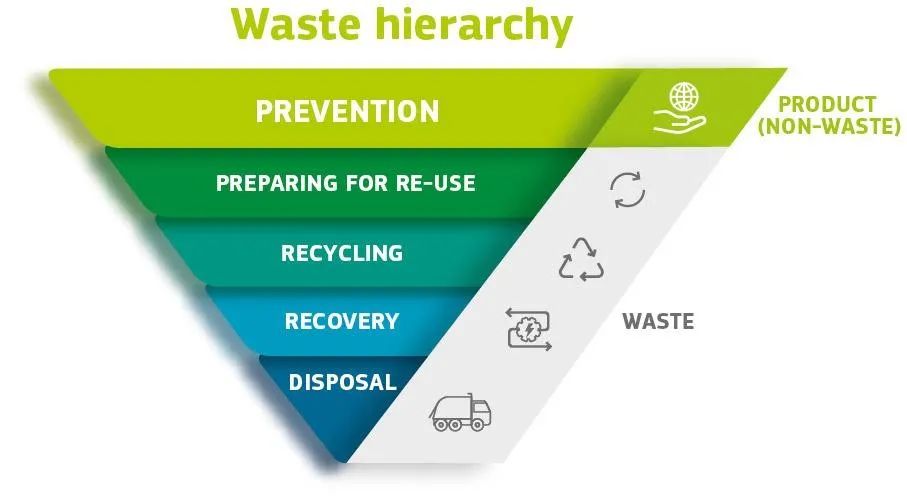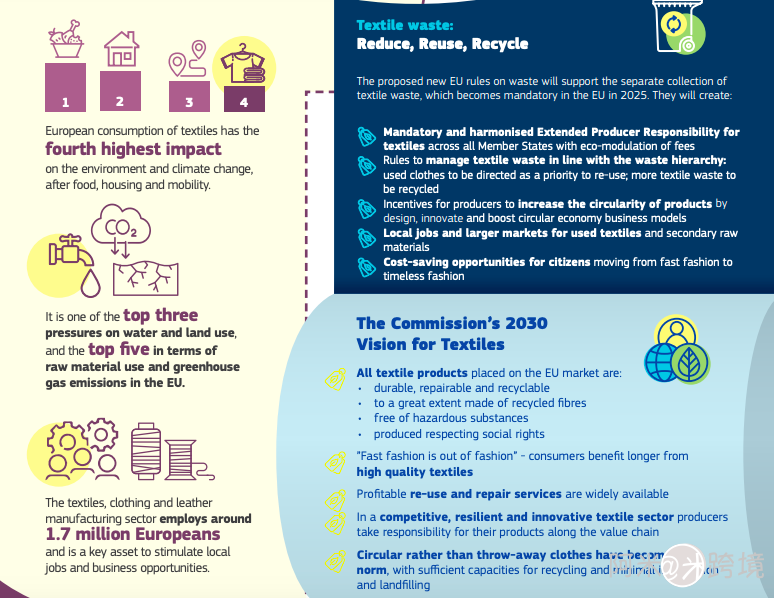On July 5, 2023, the European Commission proposed an amendment to the Waste Framework Directive focusing on textile waste. The proposal calls for the introduction of Extended Producer Responsibility (EPR) for textiles, which requires producers to take responsibility for the entire life cycle of textiles and supports the sustainable management of textile waste within the EU. This initiative will promote the development of a separate collection, sorting, reuse and recycling chain for textiles in the EU, in line with the EU's Sustainable Recycled Textiles Strategy. Enhanced recycling of used textiles is expected to create local jobs within and outside the EU, while reducing the impact of textile production on natural resources.
"The Waste Framework Directive is the legal framework for waste management within the EU. It establishes definitions related to waste management, including definitions of waste, recycling and resource utilization, waste management priorities and basic concepts.
It is understood that this is the European Commission to deal with a large number of textile resources waste and pollution of new initiatives, including the use of textile waste recycle machines. Data show that the EU produces about 12.6 million tons of textile waste annually, with 5.2 million tons generated by clothing and footwear alone, equivalent to 12 kg of waste per person per year. However, only 22% of post-consumer textile waste is currently collected separately for reuse or recycling, while the rest is usually incinerated or landfilled, placing a significant burden on the environment and resources.
The proposal fulfills the commitment made by the European Commission in the EU Strategy for Sustainable and Circular Textiles to propose measures to harmonize the rules on extended producer responsibility for textiles and to create economic incentives to make textiles more sustainable and circular.

In this new proposal, the European Commission is proposing to introduce a mandatory and harmonized Extended Producer Responsibility (EPR) scheme for textiles in all EU Member States (so far the EPR scheme has been successful in improving the management of waste from a wide range of products, such as packaging, batteries as well as electrical and electronic equipment). Making it clear that producers will bear the costs of managing textile waste will also incentivize them to reduce waste and improve the recyclability of textile products - designing better products from the start. The amount that producers pay into the EPR program will be adjusted according to the environmental performance of the textile product, also known as "eco-regulation".

The common EU rules on extended producer responsibility will also make it easier for Member States to implement the requirement for separate collection of textiles from 2025 onwards, in accordance with existing legislation. Producer contributions will be used to invest in separate collection, sorting, reuse and recycling capacity. The proposed waste management rules aim to ensure that used textiles are sorted for reuse and that textiles that cannot be reused are prioritized for recycling. Social enterprises active in textile collection and processing will benefit from increased business opportunities and a larger market for used textiles.
The proposal will also promote research and development of innovative technologies for recycling in the textile industry, such as fiber-to-fiber recycling.
The proposal also addresses the illegal export of textile waste to countries that lack waste management capacity, highlighting the importance of using textile waste recycling machines China. The new law will clarify the composition of waste as well as reusable textiles, thus discouraging the practice of exporting waste under the name of reuse. This will complement the measures taken under the "Proposal for new regulations on the transportation of waste" to ensure that the transportation of textile waste is carried out in an environmentally friendly manner.
Join the Resource Circle
Discuss professional matters with professional people
Networking + Trading + Recruitment + Knowledge Base
EPR Plastics Producer Stakeholder Responsibility Forum
The Commission's proposal for a targeted revision of the Waste Framework Directive will now be considered by the European Parliament and the Council in the ordinary legislative procedure.